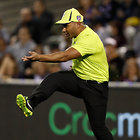Umpiring Into The Future
- Sunday, April 16 2017 @ 08:22 am ACST
- Contributed by: Wesley Hull
- Views: 2,508


The recent 2017 AFL National Male Kickstart & All Nations Championships were not just a place for players to show their wares. It was also an environment where young umpires were able to continue their development journeys. During the course of the championships, David Rodan – former Richmond, Port Adelaide and Melbourne footballer and current AFL goal umpire – spent time speaking to the boys to tell them of umpiring pathways. Also, Mathew Nichols, a current AFL umpire with almost 300 AFL games experience, spent the event teaching and mentoring the new breed.
Both were willing to speak to World Footy News and talk about the opportunities for umpires, and how important this tournament was to the development of umpires.
David Rodan: David, you played in an elite environment as a player and you have also witnessed first-hand elite level umpiring. How does that prepare you to help grow our new batch of young umpiresω
I think it’s [the Diversity Championships] a fantastic program that hasn’t been sold enough in multicultural communities as well as it could be. So I guess by me doing this and having a crack at AFL [umpiring] and trying to umpire at AFL level then hopefully I can see indigenous kids and they can see me and se umpiring is an option as well.
I think at the moment they see playing as the only option, but there are so many options in footy as well – there is working at clubs, coaching and assisting at clubs and umpiring. Of those I think that umpiring is best suited to multicultural communities, purely because of the capacity to earn some money.
I have a nephew as well that did it [umpiring] last year when he was 15. Once he got his umpiring accreditation he was able to do two or three games a weekend and could earn up $200 to $250 a week and help support his family. So, I’ve got an uncle and an aunty that love me at the moment, but I told them that in the end it is the opportunities that the AFL offer. That gives you a bit of a case study.
So after that I said OK I’ve got to round this up, so by me umpiring [and being seen by young people] as well as having many academies that I’m starting up in Victoria, there’s plenty of kids that can really get into it [umpiring]. They can get fit, there is no better way to learn the game and understand the rules and officiate and also when they support their families it is special for them and the AFL brand becomes important to them because it’s a brand that is [helping] support their families.
How important are carnival like this to give young umpires a goω
I think the fantastic thing is, and why I love this program in particular – the diversity championships – is that you can grow in all areas. You’ve got the player development, the coaches who want to get to A grade level and then you’ve got the umpires. I mean, the umpires are doing the same thing out there as the players – they’re trying to do their best and they’ve got a fantastic mentor in Matty Nichols and that’s priceless for these guys.
Some of the stories I get by phone or email from players and parents are appreciating what this program has done – not just the talent side of things but also the cultural side of things. I think that sometimes in the community, in talent programs and any programs anybody runs, [that] they can forget that [community] element – [so at these championships] they get that connection and it brings them closer to the game. [The game] is just a vehicle really for inclusion and integration to help in our community now and later on.
This [the championships] is a beautiful sight – I don’t think many programs have seen so many cultures in one place.
Mathew Nichols: How important is it for these young umpires to get to carnivals like this to develop their skillsω
It’s very important. They get the opportunity to umpire multiple games each day and in terms of what umpires are doing, actually doing it. It is one of the [best] ways for them to learn. It is a concentrated week with lots of footy and we see a marked improvement in the guys throughout the course of the week.
To their credit, when we ask them to do something they do it. They want to learn and they’re keen to try field, boundary or goal umpiring so I think that’s terrific.
The other part [of the carnival’s benefit] is that they are coming away and living away from home for a week and meeting new people. They are also having to be self-sufficient in terms of making sure their laundry is done and being in a certain place at a certain time and looking after themselves from a dietary and recovering after each of these games, so I think it’s a huge week and a great opportunity and these kids are really doing well.
I spoke last year to the head of umpiring development, Adan Davis, and he was looking at the growth in umpiring and with future plans looked towards an increase in umpires. Has this growth occurredω
It’s actually growing and that’s terrific. Generally, the issues historically haven’t been getting [recruiting] people, but in retaining them. But pleasingly in the past two to three years the numbers have really increased and we are seeing a lot more females getting involved in umpiring. We are seeing more people from diverse and multicultural backgrounds also being involved in umpiring and this carnival is a reminder of some of those people joining the umpiring ranks. We continue to encourage anyone who wants to give [umpiring] a go and be a part of the game as an opportunity.
Whatever level they get up to is up to them in a lot of respects, but there are definitely opportunities with carnivals like this one, the AFL Women’s league and the different things that are going on in footy – there is more footy being played so we need more umpires to meet that demand, so anybody wanting to give it a go would be encouraged to try.


 RSS news
RSS news Twitter
Twitter Facebook
Facebook